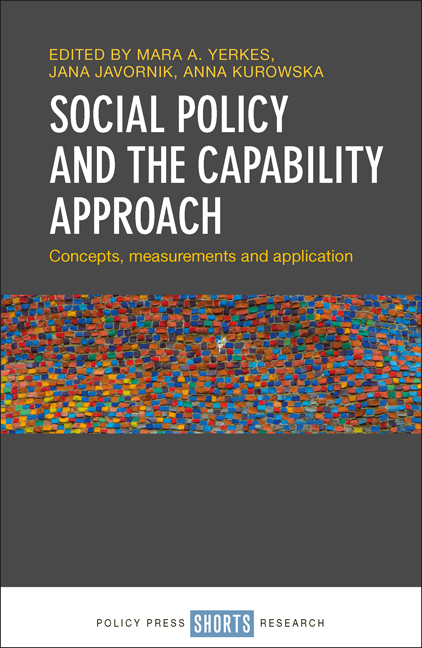Book contents
- Frontmatter
- Contents
- List of figures and tables
- Notes on the editors
- Notes on contributors
- one Rethinking social policy from a capability perspective
- two Education as investment? A comparison of the capability and social investment approaches to education policy
- three From ‘active’ to ‘capable’: a capability framework for policy and practice on ageing and later life
- four Converting shared parental leave into shared parenting: the role of employers and use of litigation by employees in the UK
- five Comparative social policy analysis of parental leave policies through the lens of the capability approach
- six Ask rather than assume: the capability approach in the practitioner setting
- seven Social investment, human rights and capabilities in practice: the case study of family homelessness in Dublin
- eight From the capability approach to capability-based social policy
- Index
six - Ask rather than assume: the capability approach in the practitioner setting
Published online by Cambridge University Press: 30 April 2022
- Frontmatter
- Contents
- List of figures and tables
- Notes on the editors
- Notes on contributors
- one Rethinking social policy from a capability perspective
- two Education as investment? A comparison of the capability and social investment approaches to education policy
- three From ‘active’ to ‘capable’: a capability framework for policy and practice on ageing and later life
- four Converting shared parental leave into shared parenting: the role of employers and use of litigation by employees in the UK
- five Comparative social policy analysis of parental leave policies through the lens of the capability approach
- six Ask rather than assume: the capability approach in the practitioner setting
- seven Social investment, human rights and capabilities in practice: the case study of family homelessness in Dublin
- eight From the capability approach to capability-based social policy
- Index
Summary
Introduction
So far, this book has focused on the ways in which the capability approach (CA) could help us evaluate social policies from the perspective of ‘end users’, individuals whom the policy is targeting. This chapter takes a different perspective and investigates the relationships between science and society, in particular social policy ‘practice’, by consulting the social policy actors (that is, researchers, professionals and practitioners who deal with or implement diverse policy decisions). This seeks to develop our innovative communication initiative, in which we engaged with social policy professionals and practitioners in a two-way, mutually enriching theory–practice dialogue. Social policies are usually made at a level different from where they are delivered and experienced. But, as Lipsky argues:
Public policy is not best understood as made in legislatures or top floor suites of high-ranking administrators. These decision-making arenas are important, of course, but they do not represent the complete picture. To the mix of places where policies are made, one must add the crowded offices and daily encounters of street-level workers. (Lipsky, 2010: xiii)
The same can be said of social policies. Using the CA as an analytical lens allows for a fresh look at social policy implementation and delivery and helps to better understand how social policies in their entirety play out in different contexts. The historical and political contexts of social policies and people's different needs and values, the cornerstone of the CA, are increasingly recognised by policy practitioners and professionals who have first-hand experience with policy delivery or application at the local level. Their experience with multiple access and eligibility-related issues on the ground may shed new light on the applicability of the CA, and how this approach may help to identify key features grounded in local knowledge, be it around social policy design, delivery or implementation.
We invited policy professionals and practitioners who work directly with diverse policy target groups in order to collect the views and opinions of professionals and practitioners as ‘nonexperts’ and street-level bureaucrats (Lipsky, 2010) while sharing our work in progress with new audiences. The group involved in this project comprises local government, a knowledge institute, social work practitioners, charities, and membership and voluntary organisations, all supporting individuals in attaining capabilities across a range of social policy domains included in this book, that is, housing, education, gender equality, family policy and care policy.
- Type
- Chapter
- Information
- Social Policy and the Capability ApproachConcepts, Measurements and Application, pp. 107 - 124Publisher: Bristol University PressPrint publication year: 2019

